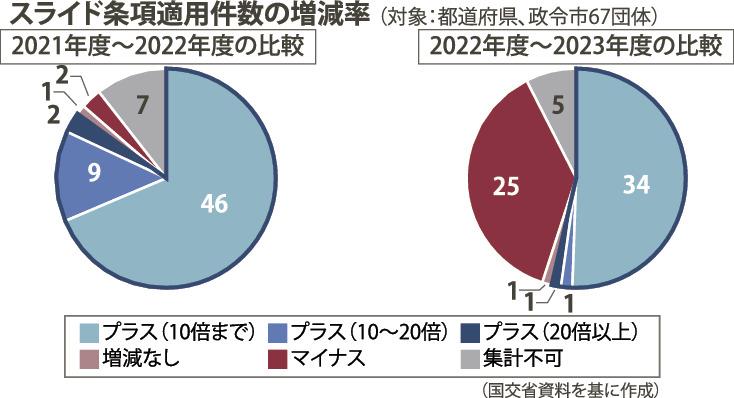When the Ministry of Land, Infrastructure, Transport and Tourism investigated the implementation status of construction slippage clauses required by designated prefectures and cities, more than half, or 36 organizations, had adopted slippage clauses in fiscal 2023, an increase from fiscal 2022. Although the sharp increase in construction material prices has slowed down, it continues to increase and remains at a high level. Based on the fact that the revised Public Works Quality Assurance Promotion Act (Public Works Quality Assurance Act) places the proper operation of slippage clauses on the responsibility of customers, it is necessary to vigorously promote the formulation of performance standards, etc., including Municipalities.

In FY2022, as raw material prices spiked, 57 organizations used sliding clauses, up from FY2021. Of these, 11 saw a sharp increase of more than 10 times and progress in using sliding clauses to pass on construction costs as required by local governments. In FY2023, 25 organizations saw a decrease in the number of applications, perhaps in response to the sharp increase in FY22, while the majority of organizations saw numbers surpass the FY22 level.
According to a survey by a private organization that publishes price data, the prices of many materials are increasing, including cement, which is showing signs of further price increases, except for lumber, which has entered a period of price decline. To prepare for future price fluctuations, each organization, including local governments, needs to create standards that can be used appropriately.
Until now, slippage clauses have been limited to provisions in the standard terms and conditions of public works contracts, but the revised Public Works Acquisition Act, which came into effect last month, makes it clear that proper performance is the legal responsibility of the client. We strongly urge public sector clients to take action, including developing performance standards and implementing practical contract changes based on them.
All designated prefectures and cities have established operating standards for both single-item slippage and inflation slippage. However, although the number of municipal construction organizations has been increasing every year, as of July 2011, only 801 organizations, or 46.5% of the total, had developed single-item slippage, and 762 organizations, or 44.3%, had developed inflation slippage. Stay. The majority of organizations that have not yet developed plans need to take immediate action based on the revised Product Guarantee Law.
Invite partners to watch the activities of Pacific Group Co., Ltd.
FanPage: https://www.facebook.com/Pacific-Group
YouTube: https://www.youtube.com/@PacificGroupCoLt






